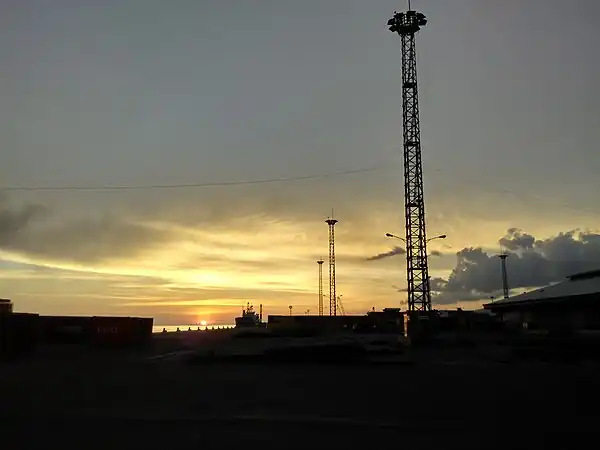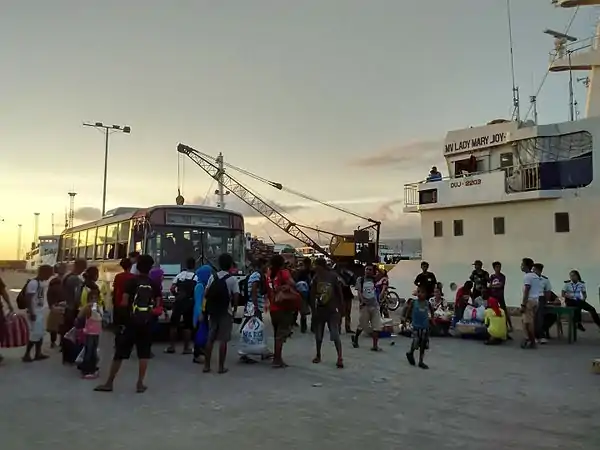Port of Zamboanga
The Port of Zamboanga (Chavacano: Puerto de Zamboanga) and (Cebuano: Pantalan sa Zamboanga) is a seaport located in Zamboanga City, Philippines. It is managed by the Philippine Ports Authority, Port Management Office-Zamboanga, (PPA, PMO-Zamboanga), otherwise known by its corporate name, Zamboanga Freeport Authority (ZFA).[3] The facility ranked second in Asia under the Super Efficient Ports in Asia study carried out in 2010 and published in the African Journal of Business Management (Vol. 5(4), pp. 1397–1407) on February 18, 2011.[4]
| Port of Zamboanga Puerto de Zamboanga | |
|---|---|
 View of the Zamboanga Port from afar | |
Click on the map for a fullscreen view | |
| Location | |
| Country | Philippines |
| Location | R.T. Lim Boulevard, Zamboanga City |
| Coordinates | 14.608197°N 120.956245°E |
| UN/LOCODE | PHZAM[1] |
| Details | |
| Operated by | Zamboanga City Special Economic Zone Authority |
| Owned by | Government |
| Type of harbour | Artificial |
| Land area | 15.6 hectares |
| No. of wharfs | 19 |
| Statistics | |
| Vessel arrivals | 14,092(2012)[2] |
| Annual cargo tonnage | 8,339,423(2012)[2] |
| Annual container volume | 2,739,558(2012)[2] |
| Passenger traffic | 3,728,028(2012)[2] |
| Website http://www.zambofreeport.com.ph/ | |
Facilities
The Port of Zamboanga is a center for sardine exports to the United States, Europe, the Middle, and Far East. 25 shipping lines operate via the port, serviced by four shipyards operating within the port boundaries and in Zamboanga City.[3]
The port has 19 docks, 12 of which are privately owned. The largest dock has capacity for up to 20 vessels, and is operated directly by the Philippine Ports Authority.[3]
Passenger transport is also a major port industry, with an annual passenger throughput exceeding 5.5 million.[5]
Statistics
Passenger statistics | ||||||||||
Year | Total passengers | Disembarking | Embarking | |||||||
| 1999 | 4,577,404 | 2,381,041 | 2,196,363 | |||||||
| 2000 | 4,924,174 | 2,575,729 | 2,348,445 | |||||||
| 2001 | 5,244,387 | 2,643,093 | 2,601,294 | |||||||
| 2002 | 5,570,493 | 2,834,766 | 2,735,727 | |||||||
| 2003 | 5,531,748 | 2,857,923 | 2,673,825 | |||||||
| 2004 | 5,665,392 | 2,962,956 | 2,702,436 | |||||||
| 2005 | 4,374,473 | 2,218,717 | 2,155,756 | |||||||
| 2006 | 3,208,531 | 1,604,273 | 1,604,258 | |||||||
| 2007 | 3,221,326 | 1,603,983 | 1,617,343 | |||||||
| 2009 | 3,546,679 | 1,754,109 | 1,792,570 | |||||||
| 2011 | 3,742,330 | 1,862,685 | 1,879,645 | |||||||
| 2012 | 3,728,028 | 1,854,535 | 1,873,493 | |||||||
| 2014 | 3,940,980 | 1,959,481 | 1,981,498 | |||||||
| 2015 | 4,220,580 | 2,104,749 | 2,115,831 | |||||||
| 2016 | 4,439,647 | 2,210,977 | 2,228,670 | |||||||
| 2017 | 4,831,215 | 2,389,896 | 2,441,319 | |||||||
Gallery
See also
References
- "United Nations Code for Trade and Transport Locations (UN/LOCODE) – (PH) Philippines (The)". UNECE. Archived from the original on May 8, 2019. Retrieved April 26, 2020.
- "[Zamboanga statistical tables for 2012]". Archived from the original (XLSX) on September 27, 2013. Retrieved July 28, 2014 – via ppa.com.ph.
- "Zamboanga International Sea-port". zamboanga.com. Archived from the original on November 29, 2020. Retrieved January 24, 2022.
- "Chittagong Port Tops 12 'Super Efficient' Ports in Asia". PortNews. July 11, 2011. Archived from the original on January 24, 2022. Retrieved January 24, 2022.
- "[Zamboanga statistical tables for 2002]". Archived from the original (XLSX) on December 26, 2005. Retrieved December 17, 2007 – via ppa.com.ph.


